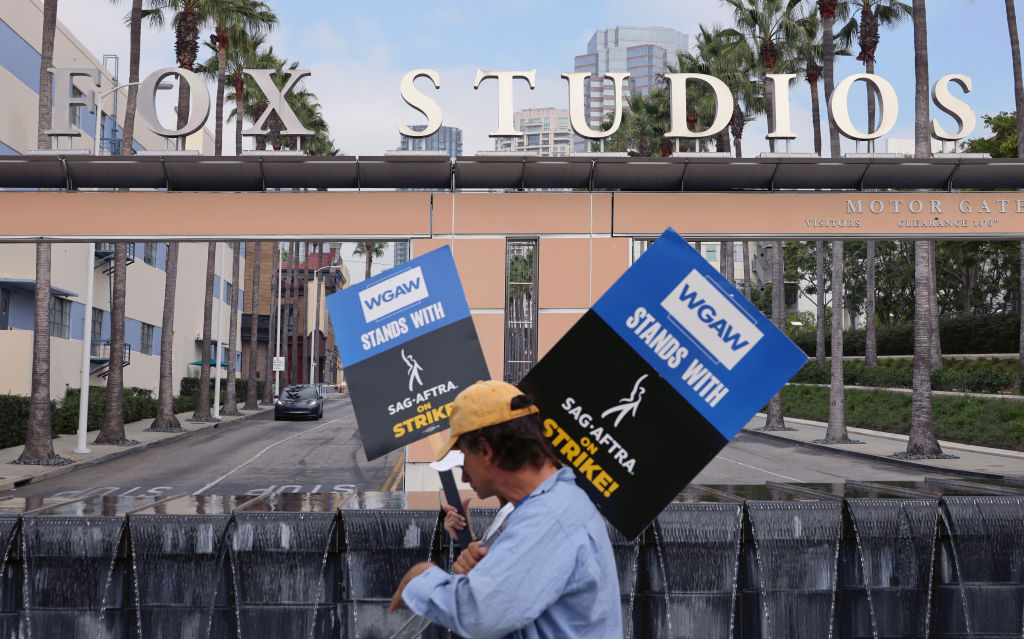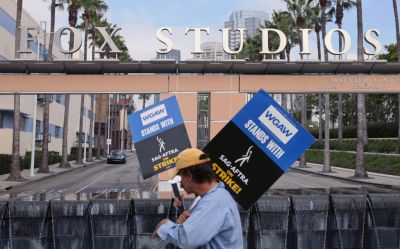The Writer’s Guild of America (WGA) and the Alliance of Motion Picture and Television Producers (AMPTP) have finally agreed to terms that will end the five-month strike that has ground Hollywood productions to a halt.
The WGA began a nearly 150-day strike on May 2 over issues with streaming compensation and fears over how artificial intelligence (AI) will affect writers’ jobs. The Screen Actors Guild (SAG-AFTRA) followed course in July. But on Tuesday, the WGA announced that its negotiating committee was in unanimous agreement about the proposed deal and suspended the strike as of early Wednesday morning.
With the strike officially over, 11,500 writers guild members will be permitted to return to work as of Wednesday. According to the WGA, the agreement’s victories include: a 5 percent minimum pay increase with additional increases in the next two years; stricter rules against AI usage; new residuals agreements tied to viewership with greater transparency; and improved contributions for benefits—a notable improvement for filmmakers who largely hop from gig-to-gig.
Meanwhile, SAG-AFTRA remains on strike, with the actors guild yet to announce future meetings with AMPTP. As 160,000 members continue picketing, though, talks could resume as early as next week, Deadline reported.
What started the strike?
Changes in technology have greatly changed the filmmaking landscape over the past decade, with streaming and subscription services largely supplanting theatrical releases or broadcast television as a primary source of entertainment.
Victims of the new normal have been recipients of residuals—actors and filmmakers who receive long-term payments for reruns, based on union agreements—who have seen fewer returns from their work on streaming platforms such as Netflix and Disney+. Streaming platforms are generally less transparent about digital viewership for particular programs than broadcast networks, and have offered limited compensation options in their contracts for long-term viewership. Broadcast networks have historically paid screenwriters and actors through syndication fees and continued advertising revenues.
“Streaming services have hit our residuals in such a way,” actor Jason Masden, whose most well-known work was in the 1990s on the sitcoms Full House, Boy Meets World, and the motion picture A Goofy Movie, tells The Dispatch. “I have quite a few properties that have been available via streaming for quite a few years now that I know for a fact are putting in those ‘minutes viewed.’ The residuals received for those projects have either been nonexistent or underwhelming compared to the saturation.”
Streaming services generally measure the success of their shows by how long viewers continuously watch them, as opposed to television, which rates and bills advertisers for overall average viewership. The negotiated deal requires greater transparency on “minutes viewed” as a measurement for providing residuals.
The WGA’s demands for greater compensation, minimum raise increases, increased health care and pension contributions, minimum staffing requirements, as well as improved employment conditions were among the most notable successes in Tuesday’s agreement.
The rise and popularization of AI chatbots like ChatGPT also stoked fears and issues within the film industry. Many actors and screenwriters object to Hollywood studios potentially taking advantage of these new technologies to write new scripts and digitally replace actors.
How has this affected the film industry?
But major studios—including Disney, Paramount, Universal, and Warner Bros. Discovery—have been hit hard by the strike. The immediate result has been the shutdown of large Hollywood productions, unable to utilize striking guild screenwriters and actors.
Multiple film projects paused or never began production over the past five months: the second Dune film, Ghostbusters Afterlife 2, Deadpool 3, and Gladiator 2 have all lost their planned release dates either because the cast is unavailable for promotional work or because production stopped. The same is true for dozens of television shows, with many set to premiere during the lucrative fall season now indefinitely delayed.
The shutdown has trickled to others in the industry, with production assistants, carpenters, lighting crews, gaffers, cinematographers, and line producers losing months of paid work.
What does the new agreement mean for AI?
One of the major complaints from both writers and actors has been the use of AI in the industry, and the strikes themselves have done nothing to slow AI developments. Major studios spent the summer on a hiring spree and bringing in new specialists to forge AI innovation in spite of the protests. Disney listed a job posting for a major creative team member to focus on AI solutions and a machine learning engineer for streaming. Sony Pictures listed an AI ethics expert position. Netflix posted a $900,000 AI product manager position.
But the new deal may hamper those efforts. The WGA deal says that AI cannot be used to write or rewrite materials, AI-generated content cannot undermine screen credits, companies cannot mandate the use of AI software, and that companies must disclose to writers when AI generated content is being used.
Still, the agreements do not formally ban the use of AI. They only regulate how AI can be credited and trained. AI can still be used in the writer’s room, but its use will now affect who receives screen credits for their work. The agreement will also likely have limited applications in other areas of film production where AI is already being introduced—including this year’s Oscar-winning Best Picture Everything Everywhere All At Once, which used AI-generated visual effects.
“Controlling the future of AI is so dangerously necessary,” says Marsden. “Personally, I would rather not see my face, voice, or likeness plugged into a situation without my expressed consent. I would rather be available to collaborate and perform along with the technology with understanding and with agreements made.”
What next?
Production on dozens of television shows and movies is now expected to jumpstart, with late night television show hosts Jimmy Fallon, Stephen Colbert, Seth Meyers, Jimmy Kimmel, and John Oliver scheduled to begin releasing new shows again by Monday. But viewers will likely notice a gap in releases over the next two years, with delays for already-announced projects as the industry struggles to return to normal.
The SAG-AFTRA strike may actually intensify before it slows down. As of Monday, the guild approved a strike authorization against the video game industry over disagreements with “wages that keep up with inflation, protections around exploitative uses of artificial intelligence, and basic safety precautions.”
It remains to be seen how the strikes will affect jobs and affect many major studios’ bottom lines. Warner Bros. Discovery disclosed in a September 5 Securities and Exchange Commission filing that the strikes were expected to cause a $300 to $500 million hit, with this year’s earnings expectations being lowered from its forecast $11billion–$11.5 billion range to $10.5 billion–$11 billion.
The combined effect of both SAG-AFTRA and the WGA striking at the same time will likely have an effect similar to the 2007 WGA strike, which caused an estimated $2.1 billion in losses, cost 37,700 jobs, and severely impacted Southern California. Forbes estimates this strike’s toll could exceed $3 billion in losses across the industry.






Please note that we at The Dispatch hold ourselves, our work, and our commenters to a higher standard than other places on the internet. We welcome comments that foster genuine debate or discussion—including comments critical of us or our work—but responses that include ad hominem attacks on fellow Dispatch members or are intended to stoke fear and anger may be moderated.
With your membership, you only have the ability to comment on The Morning Dispatch articles. Consider upgrading to join the conversation everywhere.